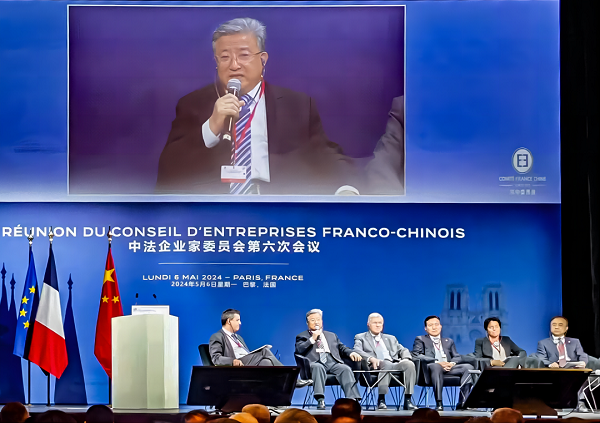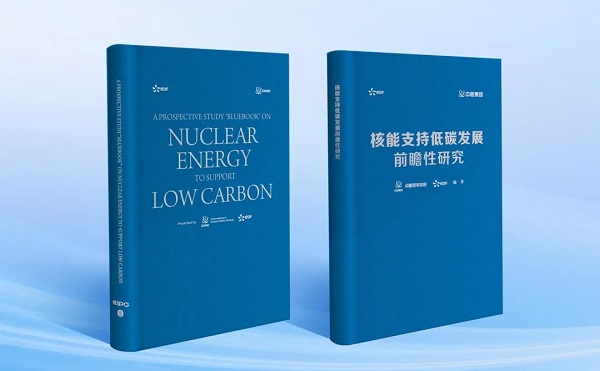This year marks the 60th anniversary of the establishment of diplomatic relations between China and France. Yu Jianfeng, chairman of China National Nuclear Corporation (CNNC), held in-depth talks with Chinese and French entrepreneurs about the green economy and low-carbon transition at the closing ceremony of the sixth meeting of the China-France Business Council on May 6th.
At the meeting, Yu and Luc Rémont, chairman and CEO of Électricité de France (EDF), jointly released a research book titled "A Prospective Study “Bluebook” on Nuclear Energy to Support Low Carbon". Yu said that both China and France are two major countries of nuclear energy and that they have played an irreplaceable role in making full use of nuclear energy to tackle climate change and promote low-carbon energy transition.
Noting that nuclear energy cooperation is an integral part of the China-France comprehensive strategic partnership, Yu called on nuclear energy companies of the two countries to further strengthen their technological and industrial cooperation for common development and deliver fruitful results.

Fruitful results in nuclear energy cooperation
Nuclear energy cooperation has become one of the most solid cooperation areas between China and France since they signed their first cooperation deal on the peaceful use of nuclear energy in 1982. During the past decades, the CNNC has become a vital player in the advancement of China-France technological cooperation of nuclear energy, forged long-term and friendly cooperation ties with its French business partners, and achieved fruitful results in the process.
As a member of the China-France Business Council and head of the low-carbon energy group on the Chinese side, the CNNC has firmly adhered to the innovation-driven development approach, deepened technological cooperation of nuclear energy, followed the development philosophy of win-win results in the high-quality development of nuclear energy, further improved global governance systems of nuclear energy through opening-up and integration, and made positive contributions to the economic and social development of the two countries as well as the building of a community with a shared future for mankind.

Expand from "hard power" to "soft power"
China and France are committed to further strengthening their bilateral cooperation on frontier topics in the research and development of nuclear energy. The publication of the blue book will further expand the scope and height of bilateral cooperation in the sector of nuclear energy and become a symbol of the increase of China's strategic planning and soft science research capabilities as well as the rise of its international influence in the nuclear fields. In the future, the two countries are expected to engage in deeper cooperation in nuclear energy development, which includes the joint exploration of the third markets, in accordance with the newly-released bluebook.
The bluebook has adopted such methods as historical review and strategic research to highlight the two countries' guiding philosophies and measures in the utilization of nuclear power and conduct in-depth studies of the nuclear industry from a macro prospective. Its research topics cover the status quo and development trend of nuclear energy worldwide and the functions of nuclear power in addressing global climate crisis, and gives a systematic description of nuclear energy development and fine practices in the two countries.
Additionally, the bluebook has fully shown China's strength in the construction of nuclear power plants and helped the international community better understand the country's nuclear power technology.
Carbon neutrality is a common goal and nuclear energy is a solution to realistic problems
Climate change is a common challenge to human survival and development. All countries have been taking actions to address the pressing issue of global climate change. Meanwhile, China and France have formulated their own state-level carbon neutrality targets.
The clean and low-carbon energy transition is of vital importance for the international community to tackle climate change. Nuclear power cooperation has become a positive consensus of China and France to better cope with energy and environmental challenges. According to data of the bluebook, as of December of 2023, France ranked second in the world with an operational nuclear power capacity of 61.37 gigawatts. France also boasted a nuclear power capacity of 1.63 gigawatts under construction. Meanwhile, China came to the third place in the world with an operational nuclear power capacity of 53.15 gigawatts. China also possessed a nuclear power capacity of 23.72 gigawatts under construction.
Both China and France are major nuclear powers. The continual collaboration between the CNNC and the EDF will provide strong momentum for global utilization and development of clean energy technology.
The CNNC and the EDF will further deepen their bilateral cooperation on this occasion, which is expected to open a new chapter of nuclear power cooperation between China and France and lay a solid foundation for the two countries in achieving their carbon neutrality goals. It is also a witness to the celebration of the 40th anniversary of nuclear power cooperation between China and France and the 60th anniversary of the establishment of diplomatic relations between the two states, helping China build a new-type international cooperation network of nuclear power.
In the years ahead, the CNNC and the EDF will further leverage their unique strength, promote the formation of new cooperation and development patterns and the improvement of global governance systems, and make greater contributions to the economic and social development of China and France and the building of a community with a shared future for mankind.